Thought Leadership From Top Scholars
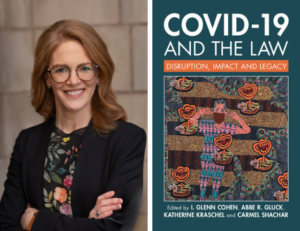 Kraschel and Co-editors Examine Impact of COVID-19 on Law and Policy in New Book
Kraschel and Co-editors Examine Impact of COVID-19 on Law and Policy in New Book
Professor Katherine (Katie) Kraschel, an expert on the intersection of reproduction, gender, bioethics and health policy, is the co-editor of a newly published book, COVID-19 and the Law: Disruption, Impact and Legacy (Cambridge University Press, 2023). The collection of essays provides a critical reflection on what changes the pandemic has already introduced, and what its legacy may be.
“This book identifies the right questions to ask as we take stock of pandemic realities and provides guidance for the many stakeholders of COVID-19’s legal legacy,” said Kraschel, a frequent commentator in the national press.
Kraschel’s co-editors include Professor I. Glenn Cohen, faculty director of the Petrie-Flom Center for Health Law Policy, Biotechnology & Bioethics at Harvard Law School, Professor Abbe Gluck, faculty director of the Solomon Center for Health Law and Policy at Yale Law School and Professor Carmel Shachar, faculty director of the Health Law and Policy Clinic at Harvard Law School.
“This book must be on the essential reading list of anyone who wants to understand this unprecedented pandemic, and how it will impact our future,” according to Lawrence Gostin, O’Neill Professor of Global Health Law at Georgetown University and Director, of the WHO Collaborating Center on National and Global Health Law.
Northeastern Law contributors to the collection, including Professor Wendy E. Parmet, faculty director of Northeastern Law’s Center for Health Policy and Law, and Professor Jeremy Paul, evaluate how healthcare and government institutions have succeeded and failed during this global ‘stress test,’ and explore how the US and the world will move forward to ensure we are better prepared for future pandemics.
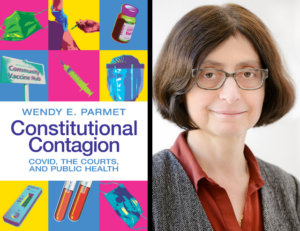
In Constitutional Contagion: COVID, the Courts, and Public Health, Professor Wendy E. Parmet Argues Reform is Critical Before the Next Pandemic Strikes
Constitutional law has helped make Americans unhealthy, argues public health law expert Professor Wendy E. Parmet in her new book, Constitutional Contagion: COVID, the Courts, and Public Health (Cambridge University Press, 2023). Drawing from law, history, political theory and public health research, Constitutional Contagion explores the history of public health laws, the nature of liberty and individual rights, and the forces that make a nation more or less vulnerable to contagion.
In this groundbreaking book, Parmet documents how the Supreme Court departed from past practice to stymie efforts to mitigate the COVID-19 pandemic and demonstrates how pre-pandemic court decisions helped to shatter social contracts, weaken democracy, and perpetuate the inequities that made the United States especially vulnerable when COVID-19 struck. Looking at judicial decisions from an earlier era, Parmet argues that the Constitution does not compel the stark individualism and disregard of public health that is evident in contemporary constitutional law decisions. Parmet shows us why, if we are to be a healthy nation, constitutional law must change.
“I began this book to discuss the dramatic changes that were occurring in public health law during the pandemic. But my work on the book led me to recognize that the threats that constitutional law posed to Americans’ health long preceded the pandemic. And they ranged far beyond decisions pertaining to public health regulations. Doctrines relating to freedom of speech, race discrimination, and voting rights, to name just a few, are all serving to undermine Americans’ health and magnify health inequities. This book shows how they do so and why the conceptions of liberty they purport to defend are needlessly thin and ahistorical.” said Parmet, recipient of the American Public Health Association Law Section’s 2022 Lifetime Achievement in Public Health Law Award.
Parmet’s previous books include The Health of Newcomers: Immigration, Health Policy, and the Case for Global Solidarity (co-author; NYU Press, 2017) and Ethical Health Care (co-author; Prentice Hall, 2005); Populations, Public Health, and the Law (Georgetown University Press, 2009); and she served as co-editor of Debates on U.S. Health Care (Sage Press, 2012).
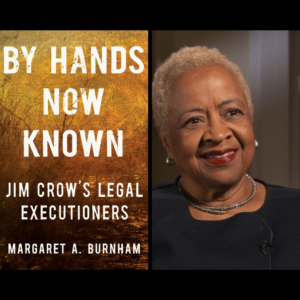 Professor Margaret Burnham’s New Book, By Hands Now Known, Challenges Our Understanding of the Jim Crow Era
Professor Margaret Burnham’s New Book, By Hands Now Known, Challenges Our Understanding of the Jim Crow Era
In 1945, a Black man named George Floyd was accused of being drunk on a Saturday evening and jailed. After he protested against a second invasive search, the arresting officer beat him to death as he lay on the cell floor. To Professor Margaret Burnham, the discovery of this precursor to the 2020 George Floyd murder was striking, but not shocking. “Lawless police acting on behalf of the state has defined how Black people experienced American law for two centuries,” says Burnham. Though the white officer who killed Floyd in 2020 was tried and convicted, many such killings have been carried out with impunity. In By Hands Now Known: Jim Crow’s Legal Executioners (W.W. Norton & Company, 2022), Burnham examines the true scope and nature of Jim Crow-era violence, the laws that condoned it, and their legacy today.
Many may recognize the names of civil rights activists — from Rosa Parks to Medgar Evers to Martin Luther King Jr. — but they likely have little sense of the quotidian violence of Jim Crow, the system of white supremacy that prevailed between the late-19th and mid-20th century. Burnham crucially fills this gap. For over a decade she has directed Northeastern University School of Law’s Civil Rights and Restorative Justice Project (CRRJ), supported by grants from the Mellon Foundation, the Ford Foundation and the Carnegie Corporation of New York. This fall, CRRJ’s groundbreaking Burnham-Nobles Digital Archive of 1,000 cases of previously undocumented racial homicides between 1930 and 1955 will be released in conjunction with the publication of By Hands Now Known. Researchers, primarily Northeastern Law and other university graduate students, used newspaper accounts, court testimony and rulings, and coroner’s reports, and traveled across the country for interviews with surviving witnesses, family and clergy. These killings — by wardens of ordinary public activities including shopkeepers, bus drivers and others — made up the “chronic, unpredictable violence that loomed over everyday Black life.”
Shining a spotlight on communities across the South, these cases concern individuals whose murders were discounted and ignored for decades. Such violence and disregard destroyed victims’ families, and their stories and memories were sometimes lost entirely to the next generation. Having unearthed this often-buried history, Burnham, who was appointed by President Biden to the national Civil Rights Cold Case Review Board in 2021, brilliantly examines why these murders went unpunished. She explains how Jim Crow laws and practices transported the norms of slavery into the American criminal justice system, and how they were sanctioned by the Supreme Court in Plessy v. Ferguson, creating a “national legal system that endorsed and sustained a missionary commitment to a future of perpetual white rule.” The violence was no accident, she argues: by solidifying white male domination and repressing Black political participation, it “sustained Jim Crow for over half a century.” In this sweeping analysis, Burnham addresses rendition, by which states make claims to other states for the return of citizens; transportation and mobility, stemming from bus drivers, police, and fellow riders victimizing Black soldiers during World War II; and abduction, because, she writes, Jim Crow “erased the crime of kidnapping from the codebooks where the victims were Black,” with Southern states failing well into the 1960s to prosecute kidnappers. Burnham also covers “the other half of the story” — fighting back. She reveals the robust resistance before the civil rights movement: demonstrations, civil lawsuits, petitions, the Black press and the key role Black women’s creative defiance of Jim Crow played in undercutting the legitimacy of the system.
By Hands Now Known focuses on the 20th century but is acutely relevant to the 21st century. Burnham probes arguments for reparations, apologies and truth proceedings that could further recover this history and allow communities to confront it and to reform legal structures tainted by the legacy of Jim Crow. Those interested in race, history and law will find it groundbreaking, illuminating and moving.
By Hands Now Known is a finalist for the Kirkus Prize in non-fiction.
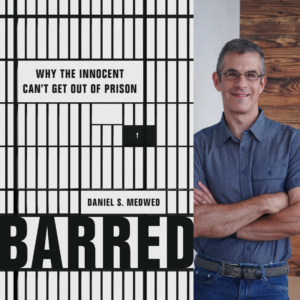 Professor Daniel Medwed’s New Book Provides Groundbreaking Exposé On Why the Innocent Can’t Get Out of Prison
Professor Daniel Medwed’s New Book Provides Groundbreaking Exposé On Why the Innocent Can’t Get Out of Prison
Professor Daniel Medwed has spent more than 20 years in the field of criminal justice, serving as a public defender, as cofounder of a law school clinic that investigated post-conviction innocence claims, and now as a professor at Northeastern University School of Law advocating for justice reform. He’s seen firsthand the deep-seated issues that plague the criminal process, namely how the system is complicit in putting innocent people behind bars. There are convictions that rest on dubious eyewitnesses. Possible police misconduct that goes uninvestigated. Subpar performance from overworked, even if well-meaning, defense attorneys. One would expect that wrongful convictions could be easily overturned by the courts, as long as evidence to prove a defendant’s innocence existed.
But in BARRED: Why the Innocent Can’t Get Out of Prison (Basic Books/Hachette Book Group, 2022), Medwed reveals how convoluted legal procedures — essentially technicalities —make exonerations nearly impossible. The rules surrounding litigation after conviction are extremely complex, with narrow guidelines on how much time a defendant has to submit notice of an appeal, which court to file in, and whether they will be allowed to present new evidence or to raise errors that occurred at the initial trial. Because of deferential attitudes toward lower courts, higher courts also tend to uphold convictions, even when there is compelling evidence of a miscarriage of justice.
One example in BARRED is the tragic story of Bobby Fennell, who spent 16 years behind bars for a murder he didn’t commit. When Medwed and his team at Brooklyn Law School’s Second Look Program re-investigated the case, they were fully convinced of Bobby’s innocence. The prosecution’s argument had rested on a single unreliable eyewitness who admitted to receiving a deal in exchange for his testimony. Even more shocking — another man ultimately confessed to being the sole perpetrator. Yet because of the stringent rules around the appeals process and introducing new evidence, Medwed’s team had no legal recourse for getting another trial. Bobby’s plight is unfortunately far from unique.
BARRED tells heartbreaking stories of people who have been wrongfully convicted to expose how technicalities are keeping innocent people behind bars. This is a powerful call to reform a system that has valued finality and efficiency over justice.
“People sometimes say that prisoners get out on ‘technicalities,’” says Medwed, a renowned innocence advocate. “That’s a misguided view. If anything, procedural technicalities are often what keep those who deserve freedom behind bars.” His previous books include Prosecution Complex: America’s Race to Convict and Its Impact on the Innocent (NYU Press, 2012) and Wrongful Convictions and the DNA Revolution: Twenty-Five Years of Freeing the Innocent (Cambridge University Press, 2017).
 Professor Michael Meltsner’s New True Crime Novel Uncovers Secrets of the Civil Rights-Era South
Professor Michael Meltsner’s New True Crime Novel Uncovers Secrets of the Civil Rights-Era South
Professor Michael Meltsner’s new novel, Mosaic: Who Paid For The Bullet? (Quid Pro Books, 2022), tells the story of a 1960s murder of a charismatic woman doctor who courted danger trying to dismantle a racially segregated healthcare system in a large Southern city. The search for who ordered the killing takes civil rights lawyer Christopher North to the centers of power, where a government intervention goes deadly wrong.
Among the many accolades for this new book, Professor Randall Kennedy of Harvard Law School has this to say: “Michael Meltsner’s hot exploration of a cold murder case is a gripping who-done-it, accompanied by brilliant insights into racial neuroses of all varieties. His nonfiction expertly describes race in the law; here, his fiction deftly probes mysteries of race in the mind and heart. I found Mosaic a fascinating read.”
The book is inspired by actual events — the struggle to end hospital segregation and denial of care — which Meltsner participated in during the 1960s as the primary lawyer who handled healthcare cases at the NAACP Legal Defense Fund. A few years ago, a prominent medical researcher asked Meltsner to investigate the murder. He found official records had gone missing, potential witnesses all dead and the trail cold, but was convinced that the crime that occurred at the intersection of law, hate, greed and government intervention had to be brought to life. Hence this “true crime” novel.
Meltsner is a prolific author. His most recent book, With Passion: An Activist Lawyer’s Life, has been widely praised; his memoir, The Making of a Civil Rights Lawyer, was published in 2006. Among his other writings are: Cruel and Unusual: The Supreme Court and Capital Punishment; Public Interest Advocacy; Reflections on Clinical Legal Education; and a novel, Short Takes. His 2011 play, “In Our Name: A Play of the Torture Years,” has been performed in New York and Boston to great acclaim.
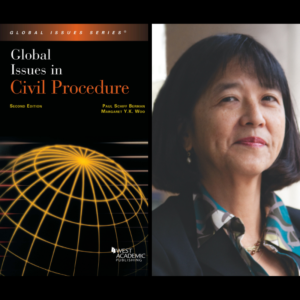
Professor Margaret Woo Co-Authors New Book on Civil Procedure from a Global Perspective
Professor Margaret Y.K. Woo has teamed up with Professor Paul Schiff Berman of GW Law to author Global Issues in Civil Procedure (West Academic, 2021), a compelling new text that is designed to facilitate the introduction of international, transnational and comparative law issues into a first-year civil procedure course. Woo is a leading expert on the Anglo-American legal system and the Chinese socialist legal system and Berman is one of the world’s foremost theorists on the interactions among legal systems.
“With an increasingly global economy, private cross-border disputes proliferate,” explains Woo, an associate of the East Asian Legal Studies Program at Harvard University. “There has been a dramatic increase in the number of litigated disputes where the parties are based in different jurisdiction or evidence is located abroad. This book focuses on some of the recurring problems with transnational litigation, including choice of law, enforcement of judgment and challenges to jurisdiction.”
Woo’s previous books include co-editing East Asian Law: Universal Norms and Local Culture (Routledge, 2003) and Chinese Justice: Civil Dispute Resolution in Contemporary China (Cambridge University Press, 2011). She is also co-author of Litigating in America: Civil Procedure in Context (Aspen Publishing, 2006) and a co-editor of the American Association of Law School’s Journal of Legal Education. She has received many prestigious grants from a variety of organizations, including the National Science Foundation and the Ford Foundation, and is on the Senior Scholar Roster for the Fulbright Scholars Program. In 2015, she served as an invited visiting researcher at the Max Planck Institute in Luxembourg. In 2018, she was selected for a Fulbright Specialist award. Under the Fulbright auspices, she partnered with faculty at the University of Florence in Italy to develop a series of comparative law seminars at the University of Florence that addressed the changing landscape of international cooperation , including BREXIT, multi-lateral treaties, and ongoing political developments in the US and Europe.
Woo and Berman’s book is a second edition that builds on a prior version co-authored by Thomas Main, a 1994 graduate of Northeastern Law who currently serves as the William S. Boyd Professor of Law at the University of Nevada, Las Vegas, William S. Boyd School of Law.
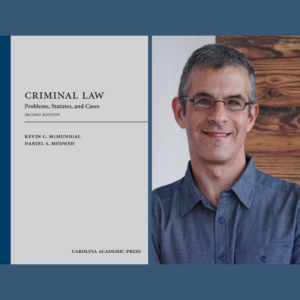 Professor Daniel Medwed’s New Casebook Blends Criminal Law Theory and Practice
Professor Daniel Medwed’s New Casebook Blends Criminal Law Theory and Practice
Professor Daniel Medwed has joined forces with Professor Kevin McMunigal of Case Western Reserve University School of Law to author Criminal Law: Problems, Statutes, and Cases (Carolina Academic Press, 2nd ed., 2021), which combines effective, innovative teaching methods, such as the use of problems and visual materials, with cases, including recent opinions on bias intimidation, possession of child pornography, threatening speech on social media and theft of computer code.
“I’m thrilled to collaborate on a book that aims to blend theory with practice—and to make criminal law come to life through contemporary problems and cutting-edge recent cases,” said Medwed, whose previous books include Prosecution Complex: America’s Race to Convict and Its Impact on the Innocent (New York University Press, 2012) and the seventh edition of Criminal Procedure: Principles, Policies, and Perspectives (West Academic, 2020, with co-authors Professor Joshua Dressler and George Thomas).
Medwed is a founding member of the board of directors of the Innocence Network, a consortium of innocence projects throughout the world, and a former president of the board of directors of the Rocky Mountain Innocence Center in Salt Lake City. He currently serves on the board of the New England Innocence Project. He is also the legal analyst for GBH News, Boston’s local NPR and PBS affiliate.
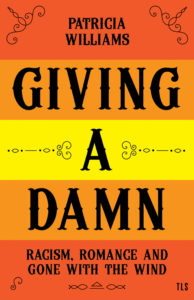 Professor Patricia Williams Has No Qualms About Giving a Damn
Professor Patricia Williams Has No Qualms About Giving a Damn
In Giving a Damn: Racism, Romance and Gone with the Wind (Harper Collins, 2021), Professor Patricia Williams finds that when you begin to unpick current debates around immigration, freedom of speech, the culture wars and wall-building, beneath them lies the unexamined history of laws by which human beings were rendered property. Williams argues that practices of dehumanization rely on structures of relationthat can be traced all the way from the plantation to ex-President Trump’s Twitter account.
“This is a legacy that cannot be fully understood as a simply a matter of personal prejudice or individual blame or innocence. I’m interested in less visible cultural artifacts that affect us all, like the aesthetics of hierarchy, the sense of geographic place, or normed modes of address,” says Williams, a past recipient of a MacArthur “Genius” Fellowship.
Williams begins in the American South with Gone With the Wind (still the second most popular book in the US after the Bible), that nostalgic tale full of the myths of the Southern belle, Southern culture, “good food and good manners.” The scene is seductive, from a distance. How nice it is to paper over the obliging slavery at the novel’s core and enjoy the wisteria-covered plantations, now the venue for weddings. But papering over has left us in a world that has never been more segregated, incarcerated or separated from each other, according to Williams. She wants to know which ideas brought the richest and most diverse nation on the planet to the brink of resurgent, violent division and what this means for the rest of the world.
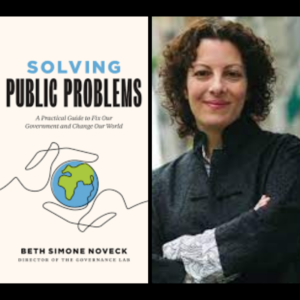 Professor Beth Noveck’s New Book Proposes Powerful Solutions to Contemporary Public Problems
Professor Beth Noveck’s New Book Proposes Powerful Solutions to Contemporary Public Problems
The challenges societies face today, from inequality to climate change to systemic racism, cannot be solved with yesterday’s toolkit. In Solving Public Problems: A Practical Guide to Fix Our Government and Change Our World (Yale University Press, 2021), Professor Beth Simone Noveck demonstrates how readers can take advantage of digital technology, data and the collective wisdom of our communities to design and deliver solutions to complex and confusing contemporary problems.
Offering a radical rethinking of the role of the public servant and the skills of the public workforce, “this book is about the vast gap between failing public institutions and the huge number of public entrepreneurs doing extraordinary things — and how to close that gap,” said Noveck.
Drawing on lessons learned from decades of advising global leaders and from original interviews and surveys of thousands of public problem solvers, Noveck provides a practical guide for public servants, community leaders, students and activists to become more effective, equitable and inclusive leaders and repair our troubled 21st-century world.The book has a free accompanying course available at solvingpublicproblems.org.
Noveck’s previous books include Smart Citizens, Smarter State: The Technologies of Expertise and the Future of Governing (Harvard University Press, 2015); Wiki Government: How Technology Can Make Government Better, Democracy Stronger and Citizens More Powerful (Brookings, 2009); and The State of Play: Law, Games and Virtual Worlds (NYU Press, 2005) (co-editor).
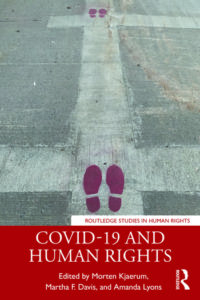 New Book Co-Edited by Professor Martha Davis Explores Impact of COVID-19 on Human Rights
New Book Co-Edited by Professor Martha Davis Explores Impact of COVID-19 on Human Rights
Professor Martha Davis, faculty director for Northeastern Law’s Program on Human Rights and the Global Economy and NuLawLab, is the co-editor of a newly published book, COVID-19 and Human Rights (Routledge, 2021). This timely collection, co-edited with Morten Kjaerum, adjunct professor at University of Aalborg, Denmark, and director of the Raoul Wallenberg Institute of Human Rights and Humanitarian Law in Lund, Sweden, and Amanda Lyons, lecturer in law and executive director of the Human Rights Center at University of Minnesota Law School, brings together original explorations of the COVID-19 pandemic and its wide-ranging, global effects on human rights.
Contributors to the collection, including Professor Brook Baker, argue that a human rights perspective is necessary to understand the pervasive consequences of the crisis. Acknowledging the pandemic as a defining moment for human rights, the volume proposes a post-crisis human rights agenda to engage civil society and government at all levels in concrete measures to roll back increasing inequality.
With rich examples, new thinking and provocative analyses of human rights, COVID-19, pandemics, crises and inequality, this book will be of key interest to scholars, students and practitioners in all areas of human rights, global governance and public health, as well as others who are ready to embark on an exploration of these complex challenges.
“The pieces in this collection make the case that a human rights perspective is critical to both the response to COVID-19 and the recovery from the pandemic,” said Davis.
Davis’ previous books include Global Urban Justice: The Rise of Human Rights Cities; Human Rights Advocacy in the United States; Bringing Human Rights Home; Brutal Need: Lawyers and the Welfare Rights Movement and Research Handbook on Human Rights and Poverty.
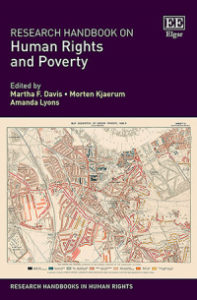 Professor Martha Davis Co-Edits New Handbook on Human Rights and Poverty
Professor Martha Davis Co-Edits New Handbook on Human Rights and Poverty
Professor Martha Davis, faculty director for Northeastern Law’s Program on Human Rights and the Global Economy and the NuLawLab, is a co-editor of the newly published Research Handbook on Human Rights and Poverty (Edward Elgar Publishing, 2021). The book explores the nexus between human rights, poverty and inequality as a critical lens for understanding and addressing key challenges of the coming decades. It is an essential reference guide for those who teach in these areas and for scholars and students developing future research agendas of their own and will also serve as a much-needed resource for people working practically to address poverty in both the Global North and Global South.
“Bringing human rights tools and perspectives to bear on persistent poverty and inequality is more important than ever in this moment of political and social unrest,” said Professor Davis, whose previous books include Global Urban Justice: The Rise of Human Rights Cities; Human Rights Advocacy in the United States; Bringing Human Rights Home; and Brutal Need: Lawyers and the Welfare Rights Movement.
Co-edited by Morten Kjaerum, adjunct professor at University of Aalborg, Denmark, and director of the Raoul Wallenberg Institute of Human Rights and Humanitarian Law in Lund, Sweden, and Amanda Lyons, lecturer in law and executive director of the Human Rights Center at University of Minnesota Law School, the Research Handbook starts from the premise that poverty is not solely an issue of minimum income and explores the profound ways that deprivation and distributive inequality of power and capability relate to economic, social, cultural, civil and political rights. Leading experts in the human rights field representing a range of disciplines outline a future research agenda to address poverty and inequality head on. Beginning with an interrogation of the definition of poverty, subsequent chapters analyze the dynamics of poverty and inequality in relation to matters such as race, gender, age, disability, sexual orientation, geography and migration status. The rights to housing, land, health, work, education, protest and access to justice are also explored, with a recognition of the challenges posed by corruption, climate change and new technologies.
The Program on Human Rights and the Global Economy (PHRGE) at Northeastern Law, the Human Rights Center at University of Minnesota School of Law and the Raoul Wallenberg Institute of Human Rights and Humanitarian Law in Lund, Sweden, co-hosted two webinars on the book on April 14 and May 18, 2021.
Professor Shalanda Baker Harnesses “Revolutionary Power” in Revolutionary Power: An Activist’s Guide to the Energy Transition
In Revolutionary Power: An Activist’s Guide to the Energy Transition (Island Press, 2021), Professor Shalanda Baker ’05 arms those made most vulnerable by our current energy system with the tools they need to remake the system in the service of their humanity. She argues that people of color, poor people and indigenous people must engage in the creation of the new energy system in order to upend the unequal power dynamics of the current system. Baker tells the stories of those who have been left behind in our current system and those who are working to be architects of a more just system. She draws from her experience as an energy-justice advocate, a lawyer and a queer woman of color to inspire activists working to build our new energy system. “Revolutionary Power is a playbook for the energy transformation complete with a step-by-step analysis of the key energy policy areas that are ripe for intervention,” said Baker, co-founder and co-director of the Initiative for Energy Justice.
Professor Sonia E. Rolland Co-authors an Interdisciplinary Study of the Nature of Order Underlying China’s Globalism
The post-war liberal economic order seems to be crumbling, placing the world at an inflection point. China has emerged as a major force, and other emerging economies seek to play a role in shaping world trade and investment law. Might they band together to mount a wholesale challenge to current rules and institutions? Emerging Powers in the International Economic Order argues that resistance from the Global South and the creation of China-led alternative spaces will have some impact, but no robust alternative vision will emerge. Significant legal innovations from the South depart from the mainstream neoliberal model, but these countries are driven by pragmatism and strategic self-interest and not a common ideological orientation, nor do they intend to fully dismantle the current ordering. In Emerging Powers in the International Economic Order (Cambridge University Press, 2019), Professor Sonia Rolland and her co-author, David Trubek, predict a more pluralistic world, which is neither the continued hegemony of neoliberalism nor a full blown alternative to it.
Professors Rashmi Dyal-Chand and Peter Enrich Release New Book on the Current State of American Urban Cores
The problems of entrenched poverty and economic underdevelopment in American urban cores involve multiple overlapping challenges that have stymied consistent and long-term progress for many decades. Although inadequate and misguided laws are not solely responsible for this state of affairs, good laws - and good lawyering - can contribute enormously to overcoming the challenges of the urban cores. In Legal Scholarship for the Urban Core: From the Ground Up (Cambridge University Press, 2019), Professors Rashmi Dyal-Chand and Peter Enrich showcase a range of scholarly analyses, covering a broad spectrum of legal issues and methodologies, to demonstrate how law and lawyers can and do respond to the challenges of the urban cores. The co-edited book provides paths forward at the local level in the face of federal political paralysis and inattention and lays a foundation for new paradigms and new approaches to intransigent problems. Modeling engaged legal scholarship as a pragmatic response to contemporary challenges, this book is for anyone concerned about the current state of American urban cores.
Professor Rashmi Dyal-Chand Says Sharing is a Path to Business Success in Collaborative Capitalism in American Cities: Reforming Urban Market Regulations
In many American cities, the urban cores still suffer. Poverty and unemployment remain endemic, despite policy initiatives aimed at systemic solutions. In Collaborative Capitalism in American Cities: Reforming Urban Market Regulations (Cambridge University Press, 2018), Professor Rashmi Dyal-Chand focuses on how businesses in some urban cores are succeeding despite the challenges.
Using three examples of urban collaborative capitalism, Dyal-Chand extrapolates a set of lessons about sharing. She argues that sharing can fuel business development and growth. Sharing among businesses can be critical for their economic survival. Sharing can also produce a particularly stable form of economic growth by giving economic stability to employees.
“Sharing can allow American businesses to remain competitive while returning more wealth to their workers, and this more collaborative approach can help solve the problems of urban underdevelopment and poverty,” said Dyal-Chand, who served as an associate general counsel of The Community Builders, Inc., a nonprofit affordable housing developer, prior to joining academia.
Dyal-Chand’s book has already been lauded for its insights. According to Joseph William Singer, Bussey Professor of Law at Harvard Law School and author of No Freedom Without Regulation: The Hidden Lesson of the Subprime Crisis, the book is, “An eye-opening exploration of how cooperation might temper the harshness of economic competition and reverse our slide into inequality while restoring a measure of economic stability to the many who have lost it in recent years.”
Second Edition of Professor Martha Davis’ Human Rights Advocacy in the United States Now Available
The second edition of Professor Martha Davis’ co-authored book, Human Rights Advocacy in the United States, has been released by West Academic Publishing. First published in 2014, it is the only law school casebook devoted to human rights advocacy in the United States.
“Understanding human rights tools is more important than ever to U.S. legal advocates,” said Davis, a human rights and social justice expert who has co-edited two other books, Global Urban Justice: The Rise of Human Rights Cities and Bringing Human Rights Home, and is the author of Brutal Need: Lawyers and the Welfare Rights Movement, 1960-1973. “From water quality in Flint, Michigan, to issues of federalism, human rights norms form a backdrop that domestic advocates cannot afford to ignore,” she added.
The book illuminates a range of both hot topics and persistent theoretical and doctrinal issues while equipping students to thoughtfully engage these tools in their own practice of law, including immigration, rights of indigenous peoples, counterterrorism and human rights, disparities in access to health care, and the right to housing, while also exploring fundamental issues of federalism, sovereignty, judicial review and legal ethics.
The second edition is updated to reflect the current US political landscape as well as the enduring value of the human rights framework. New examples focus on lead contamination of drinking water and disparities in access to health care. The second edition explores how, even in the midst of seismic shifts in US politics, human rights continue to offer a powerful normative frame of individual rights and government obligations, as well as important strategies to complement more traditional litigation and advocacy approaches.
Professor Libby Adler Calls for LGBT Movement to Change Course in Gay Priori
Many legal issues that greatly impact the lives of the LGBT community’s most marginalized members — especially those who are transgender, homeless, underage or non-white — often go unnoticed, argues Professor Libby Adler in her new book, Gay Priori: A Queer Critical Legal Studies Approach to Law Reform (Duke University Press). Adler is calling for the LGBT community, which she says currently focuses on a narrow array of reform objectives — namely, same-sex marriage, antidiscrimination protections and hate crimes statutes — to change directions, with a focus on better meeting the needs of all LGBT people.
“This current approach is too narrow,” says Adler, a member of the Northeastern University School of Law faculty who has written extensively on sexuality, gender, family and children. “The emphasis on equal rights flattens LGBT identities, perpetuates the uneven distribution of resources such as safety, housing, health and wealth, and limits the capacity for advocates to imagine change.”
To combat these effects, Adler says resources must be used to advocate for changes to low-profile legal conditions in such areas as foster care, contract law, shelter regulation and police discretion. A shift in perspective, Adler contends, will serve to open up a new world of reform possibilities.
For more information, and to order the book directly from Duke University Press at a 30 percent discount, please visit dukeupress.edu/gay-priori and enter the coupon code E18ADLER during checkout.
Professor Michael Meltsner Publishes Memoir on Civil Rights Career
Matthews Distinguished University Professor Mike Meltsner has published a new book, With Passion: An Activist Lawyer’s Journey (Twelve Tables Press, 2018). Meltsner, who grew up in a Depression-battered family tangled by a mortal secret, tells the improbable story of an unsung hero of the civil rights movement who thought of himself as a “miscast” lawyer, but ended up defending peaceful protesters, representing Mohammad Ali, suing Robert Moses, counseling Lenny Bruce, bringing the case that integrated hundreds of Southern hospitals, and was named “the principal architect of the death penalty abolition movement in the United States” by the City University of New York (CUNY) upon awarding him an honorary degree.
More than a meditation on often-frustrating legal efforts to fight inequality and racism, Meltsner’s memoir vividly recounts the life of a New York kid, struggling to make sense of coming of age amid the tumult of vast demographic and cultural changes in the city. Hired by Thurgood Marshall, Meltsner argued major civil rights cases for the NAACP Legal Defense Fund.
“The story of the civil rights legal campaigns of the mid-20th century has been well told, but on two fronts, Mike Meltsner’s sublimely written memoir recasts the familiar narrative,” said University Distinguished Professor Margaret Burnham, head of the law school’s Civil Rights and Restorative Justice Project. “Exploring the respective roles of litigation and community advocacy, this civil rights pioneer explains how organizations like the NAACP Legal Defense Fund made the critical shift from the mostly race-based docket of the 1950s and early ’60s to one focusing on poverty, particularly in the criminal justice arena. And few books about the lawyering craft do a better job of conveying the peculiar artistry that emerges from the conjoiner of intellectual prowess, deep knowledge, strategic vision and emotional intensity. Like bright blossoms on a gritty New York City tree, Meltsner’s cases offer thrills, surprise and most importantly, hope. Beautiful stories exquisitely told.”
Meltsner turned his attention to academia in 1970, co-founding the clinical program at Columbia Law School, and then serving as dean of Northeastern University School of Law from 1979 until 1984. Meltsner’s books include a memoir, The Making of a Civil Rights Lawyer; Cruel and Unusual: The Supreme Court and Capital Punishment; Public Interest Advocacy; Reflections on Clinical Legal Education; and Short Takes, a novel. His 2011 play, “In Our Name: A Play of the Torture Years,” has been performed in New York and Boston to great acclaim. Among his many awards are a Guggenheim and an American Academy of Berlin Prize Fellowship.
 Kraschel and Co-editors Examine Impact of COVID-19 on Law and Policy in New Book
Kraschel and Co-editors Examine Impact of COVID-19 on Law and Policy in New Book
 Professor Margaret Burnham’s New Book, By Hands Now Known, Challenges Our Understanding of the Jim Crow Era
Professor Margaret Burnham’s New Book, By Hands Now Known, Challenges Our Understanding of the Jim Crow Era Professor Daniel Medwed’s New Book Provides Groundbreaking Exposé On Why the Innocent Can’t Get Out of Prison
Professor Daniel Medwed’s New Book Provides Groundbreaking Exposé On Why the Innocent Can’t Get Out of Prison Professor Michael Meltsner’s New True Crime Novel Uncovers Secrets of the Civil Rights-Era South
Professor Michael Meltsner’s New True Crime Novel Uncovers Secrets of the Civil Rights-Era South
 Professor Daniel Medwed’s New Casebook Blends Criminal Law Theory and Practice
Professor Daniel Medwed’s New Casebook Blends Criminal Law Theory and Practice Professor Patricia Williams Has No Qualms About Giving a Damn
Professor Patricia Williams Has No Qualms About Giving a Damn Professor Beth Noveck’s New Book Proposes Powerful Solutions to Contemporary Public Problems
Professor Beth Noveck’s New Book Proposes Powerful Solutions to Contemporary Public Problems
